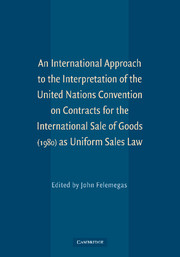18 results
Index
-
- Book:
- An International Approach to the Interpretation of the United Nations Convention on Contracts for the International Sale of Goods (1980) as Uniform Sales Law
- Published online:
- 20 October 2009
- Print publication:
- 08 January 2007, pp 525-528
-
- Chapter
- Export citation
Introduction, by John Felemegas
-
-
- Book:
- An International Approach to the Interpretation of the United Nations Convention on Contracts for the International Sale of Goods (1980) as Uniform Sales Law
- Published online:
- 20 October 2009
- Print publication:
- 08 January 2007, pp 1-38
-
- Chapter
- Export citation
Art. 58 CISG–PECL, by John Felemegas [Australia]
-
-
- Book:
- An International Approach to the Interpretation of the United Nations Convention on Contracts for the International Sale of Goods (1980) as Uniform Sales Law
- Published online:
- 20 October 2009
- Print publication:
- 08 January 2007, pp 430-436
-
- Chapter
- Export citation
Arts. 28, 46, 62 CISG–UP, by John Felemegas [Australia]
-
-
- Book:
- An International Approach to the Interpretation of the United Nations Convention on Contracts for the International Sale of Goods (1980) as Uniform Sales Law
- Published online:
- 20 October 2009
- Print publication:
- 08 January 2007, pp 143-163
-
- Chapter
- Export citation
Art. 20 CISG–PECL, by John Felemegas [Australia]
-
-
- Book:
- An International Approach to the Interpretation of the United Nations Convention on Contracts for the International Sale of Goods (1980) as Uniform Sales Law
- Published online:
- 20 October 2009
- Print publication:
- 08 January 2007, pp 321-324
-
- Chapter
- Export citation
Art. 21 CISG–UP, by John Felemegas [Australia]
-
-
- Book:
- An International Approach to the Interpretation of the United Nations Convention on Contracts for the International Sale of Goods (1980) as Uniform Sales Law
- Published online:
- 20 October 2009
- Print publication:
- 08 January 2007, pp 111-116
-
- Chapter
- Export citation
PART THREE - CISG–PECL COMPARATIVE EDITORIALS
-
-
- Book:
- An International Approach to the Interpretation of the United Nations Convention on Contracts for the International Sale of Goods (1980) as Uniform Sales Law
- Published online:
- 20 October 2009
- Print publication:
- 08 January 2007, pp -
-
- Chapter
- Export citation
Art. 21 CISG–PECL, by John Felemegas [Australia]
-
-
- Book:
- An International Approach to the Interpretation of the United Nations Convention on Contracts for the International Sale of Goods (1980) as Uniform Sales Law
- Published online:
- 20 October 2009
- Print publication:
- 08 January 2007, pp 324-329
-
- Chapter
- Export citation
Contributors
-
- Book:
- An International Approach to the Interpretation of the United Nations Convention on Contracts for the International Sale of Goods (1980) as Uniform Sales Law
- Published online:
- 20 October 2009
- Print publication:
- 08 January 2007, pp xiii-xvi
-
- Chapter
- Export citation
Frontmatter
-
- Book:
- An International Approach to the Interpretation of the United Nations Convention on Contracts for the International Sale of Goods (1980) as Uniform Sales Law
- Published online:
- 20 October 2009
- Print publication:
- 08 January 2007, pp i-iv
-
- Chapter
- Export citation

An International Approach to the Interpretation of the United Nations Convention on Contracts for the International Sale of Goods (1980) as Uniform Sales Law
-
- Published online:
- 20 October 2009
- Print publication:
- 08 January 2007
Art. 22 CISG–UP, by John Felemegas [Australia]
-
-
- Book:
- An International Approach to the Interpretation of the United Nations Convention on Contracts for the International Sale of Goods (1980) as Uniform Sales Law
- Published online:
- 20 October 2009
- Print publication:
- 08 January 2007, pp 116-119
-
- Chapter
- Export citation
Art. 20 CISG–UP, by John Felemegas [Australia]
-
-
- Book:
- An International Approach to the Interpretation of the United Nations Convention on Contracts for the International Sale of Goods (1980) as Uniform Sales Law
- Published online:
- 20 October 2009
- Print publication:
- 08 January 2007, pp 106-110
-
- Chapter
- Export citation
PART ONE - INTRODUCTION
-
-
- Book:
- An International Approach to the Interpretation of the United Nations Convention on Contracts for the International Sale of Goods (1980) as Uniform Sales Law
- Published online:
- 20 October 2009
- Print publication:
- 08 January 2007, pp -
-
- Chapter
- Export citation
PART TWO - CISG–UNIDROIT Principles comparative editorials
-
-
- Book:
- An International Approach to the Interpretation of the United Nations Convention on Contracts for the International Sale of Goods (1980) as Uniform Sales Law
- Published online:
- 20 October 2009
- Print publication:
- 08 January 2007, pp -
-
- Chapter
- Export citation
Contents
-
- Book:
- An International Approach to the Interpretation of the United Nations Convention on Contracts for the International Sale of Goods (1980) as Uniform Sales Law
- Published online:
- 20 October 2009
- Print publication:
- 08 January 2007, pp v-viii
-
- Chapter
- Export citation
Art. 7 CISG–PECL, by John Felemegas [Australia]
-
-
- Book:
- An International Approach to the Interpretation of the United Nations Convention on Contracts for the International Sale of Goods (1980) as Uniform Sales Law
- Published online:
- 20 October 2009
- Print publication:
- 08 January 2007, pp 268-272
-
- Chapter
- Export citation
Art. 24 CISG–UP, by John Felemegas [Australia]
-
-
- Book:
- An International Approach to the Interpretation of the United Nations Convention on Contracts for the International Sale of Goods (1980) as Uniform Sales Law
- Published online:
- 20 October 2009
- Print publication:
- 08 January 2007, pp 119-124
-
- Chapter
- Export citation



